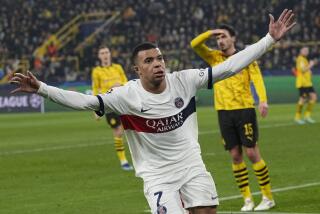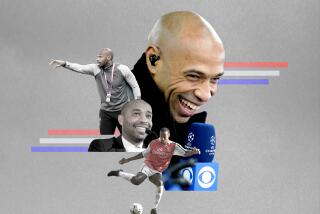Can Zidane deliver one last time?
- Share via
Paris — ON THE NIGHT in 1998 when France conquered the world, an image of Zinedine Zidane flashed onto the Arc de Triomphe, which had been converted into a giant screen for the celebration of the country’s World Cup victory.
The throngs surrounding the monument roared “Zidane president!”
Zidane, captain of the national team, grew up in a tough housing project in Marseilles. His father had emigrated from Algeria and worked as a night watchman. In a country in which the sons of North African immigrants are almost invisible in politics, the chant of the Parisian crowd was revolutionary. And the euphoria transcended sports.
Scoring two goals in the final against Brazil, Zidane led a harmonious squad of black, white and Arab Frenchmen that became a symbol of hope. During that jubilant July, this wary, stratified society embraced the “other France” -- a fast-growing, downtrodden, predominantly Muslim population of foreign origin.
Zidane’s exploits have helped both “pure” and immigrant French accept the idea of minorities as full citizens. Le Monde calls him “the leader of multiethnic France, of the France that loves its diversity.”
Love and diversity have limits, however. During a game between France and Algeria here in October 2001, French youths of Arab origin booed “La Marseillaise” and chanted praise of Osama bin Laden. Then came the electoral triumph of Jean-Marie Le Pen of the far-right, anti-immigrant National Front in the first round of the 2002 presidential elections. Last year, immigrant slums erupted in rage and fire during nationwide youth riots.
But Zidane, 34, endures. Like a reluctant gunslinger accepting a last showdown, a beloved statesman returning from exile, he will play in this World Cup before he retires for good.
Once again, the story will be bigger than sports. Until 1998, the French middle class tended to snub soccer in favor of such genteel pastimes as tennis. The immigrant working class often rooted for teams from family homelands.
But Les Bleus, as the blue-shirted national squad is known, have united both worlds with the kind of passion that can topple rulers and start wars in wilder, less Cartesian countries.
Zidane’s performance could help decide the survival of a French government endangered by unrest, scandal and economic crisis. Politicians long for a cup. The last one sent their popularity soaring. A bad showing in Germany will worsen the national malaise.
The man who incarnates French hopes has racked up trophies and superlatives as one of the world’s top players, playing the last five years with star-studded Real Madrid. A midfielder with an elegant, brooding style, Zidane takes command of games with one-touch precision passes and intricate ball handling. He does something artful, dangerous or at least interesting almost every time he gets the ball.
Off the field, he consistently tops polls of the most admired public figures in France. A newly released documentary makes it clear that the French are crazy about him. Rather than another highlight collection -- “Zizou” paralyzing defenders and mowing down goalies -- the film simply follows his every move through an entire game from multiple close-up angles. It’s an existential portrait of an icon: the sweaty grimace, the steely green eyes of his Berber ancestors, the balding pate of a warrior-monk.
Zidane represents rare values. In a celebrity culture of excess -- David Beckham’s tabloid flash, Diego Maradona’s apocalyptic appetites -- he is a shy family man devoted to his wife and four sons. In a crabby society in which everyone has an opinion or a complaint, he minds his own business. He refuses to discuss politics, except for terse criticism of Le Pen in 2002. He calls himself a “non-practicing Muslim.”
Despite the seeming national obsession with vacations, strikes, early retirement and other ways of avoiding work, he is about second-generation discipline and dignity.
“My parents always taught us three things,” he once said. “Respect, work and being serious.”
But time diminishes heroes. A thigh injury hobbled him during France’s first-round demise in the 2004 World Cup. He quit the national team, saying his game had faded and he wanted to make way for younger talent. This year he changed his mind -- his country needed him.
A fairy-tale farewell in Germany looks unlikely. During a friendly match against Mexico here last week, he seemed lethargic. Even if he’s brilliant, Les Bleus will have their hands full with powerhouses such as Brazil and Italy.
Ever since boyhood pickup games on the asphalt of Marseilles, however, Zidane has beaten the odds. He has pride and a contained rage that flares when pushed. He feels the yearning of the French, wracked by doubt and decline, for him to deliver one last time.
As bleak as things might appear, Zidane knows about miracles. Eight years ago, the son of an Algerian watchman ruled France -- at least for a night.
More to Read
Sign up for Essential California
The most important California stories and recommendations in your inbox every morning.
You may occasionally receive promotional content from the Los Angeles Times.










